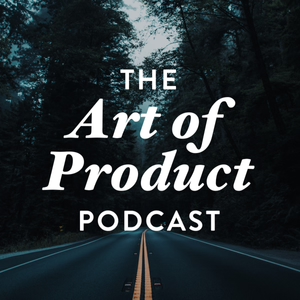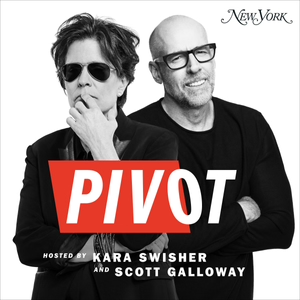
Can technology help to rebuild after disasters?
07/25/23 • 47 min
2022 saw 421 registered natural disasters worldwide, including floods, drought, famine and earthquakes. It also saw new or escalating conflicts in Sudan, Syria and Ukraine. Thousands of NGOs, activists and charity groups do what they can to help those in need, whilst Governments and research groups try to come up with better ways of predicting, mitigating and avoiding disasters.
But you may be surprised to know there's a whole heap of ways that tech can help with rebuilding and prevention efforts. In this episode, we look at how grassroots groups and major organizations work together to leverage lateral thinking, agile mindsets, and technological expertise to mitigate the effects of societal upheaval, and even help in rebuilding efforts.
This episode was inspired by meeting Valerie Kuzmenko, a tech executive from Donetsk, who had to flee when the area became the epicentre of the original Ukraine war in 2014. In 2022, she found herself in Kyiv at the start of the invasion, and had to flee to London with her family and nothing more than a suitcase. Since recording this episode, she's found work as the Chief Marketing Officer at ScaleLabTech.
Using tech to rebuild society is a field which draws together large and small organisations in partnership. At the larger end of the scale are organizations like Airbel labs. They are the research arm of the International Rescue Committee. Atish Gonsalves heads up their EdTech wing. Airbel partner with a number of large organizations such as Whatsapp to provide educational solutions in areas where schooling is difficult, and work hard to provide not only resources for children who would otherwise be out of education for long periods, but also to help teachers continue to operate through tough times and disaster recovery.
Likewise, Hewlett Packard Enterprise use their technological expertise to provide solutions and assistance on some of the most pressing humanitarian issues, for example working with the American Red Cross to use AI to help route and maintain supplies of donated blood. However, HPE Head of Global Social Impact and Deputy Director of the HPE Foundation Fred Tan explains, it's by helping provide solutions and partnering with smaller, grassroots organisations that can encourage new ways of thinking and problem solving which can make a truly global difference, as well as encouraging HPE to think about its own operations.
And on the ground, small organizations are doing truly remarkable work with technology. We're joined by Oksana Simnova and Vatalii Lopushanskyi of RebuildUA and UADamage respectively. These two groups grew out of very different fields - RebuildUA was in Argitech working on drone mapping Ukraine's enormous farms, and UADamage grew out of a team working on Neural Network and AI applications. They now work closely together, using drones and satellite images to map out damage to buildings in Ukraine, and then logging and assessing the damage caused and matching it against pre-war imagery to assess the need for repair. They are hopeful that their findings will help rebuild Ukraine, but also be useful in mine clearing activities in future war zones.
2022 saw 421 registered natural disasters worldwide, including floods, drought, famine and earthquakes. It also saw new or escalating conflicts in Sudan, Syria and Ukraine. Thousands of NGOs, activists and charity groups do what they can to help those in need, whilst Governments and research groups try to come up with better ways of predicting, mitigating and avoiding disasters.
But you may be surprised to know there's a whole heap of ways that tech can help with rebuilding and prevention efforts. In this episode, we look at how grassroots groups and major organizations work together to leverage lateral thinking, agile mindsets, and technological expertise to mitigate the effects of societal upheaval, and even help in rebuilding efforts.
This episode was inspired by meeting Valerie Kuzmenko, a tech executive from Donetsk, who had to flee when the area became the epicentre of the original Ukraine war in 2014. In 2022, she found herself in Kyiv at the start of the invasion, and had to flee to London with her family and nothing more than a suitcase. Since recording this episode, she's found work as the Chief Marketing Officer at ScaleLabTech.
Using tech to rebuild society is a field which draws together large and small organisations in partnership. At the larger end of the scale are organizations like Airbel labs. They are the research arm of the International Rescue Committee. Atish Gonsalves heads up their EdTech wing. Airbel partner with a number of large organizations such as Whatsapp to provide educational solutions in areas where schooling is difficult, and work hard to provide not only resources for children who would otherwise be out of education for long periods, but also to help teachers continue to operate through tough times and disaster recovery.
Likewise, Hewlett Packard Enterprise use their technological expertise to provide solutions and assistance on some of the most pressing humanitarian issues, for example working with the American Red Cross to use AI to help route and maintain supplies of donated blood. However, HPE Head of Global Social Impact and Deputy Director of the HPE Foundation Fred Tan explains, it's by helping provide solutions and partnering with smaller, grassroots organisations that can encourage new ways of thinking and problem solving which can make a truly global difference, as well as encouraging HPE to think about its own operations.
And on the ground, small organizations are doing truly remarkable work with technology. We're joined by Oksana Simnova and Vatalii Lopushanskyi of RebuildUA and UADamage respectively. These two groups grew out of very different fields - RebuildUA was in Argitech working on drone mapping Ukraine's enormous farms, and UADamage grew out of a team working on Neural Network and AI applications. They now work closely together, using drones and satellite images to map out damage to buildings in Ukraine, and then logging and assessing the damage caused and matching it against pre-war imagery to assess the need for repair. They are hopeful that their findings will help rebuild Ukraine, but also be useful in mine clearing activities in future war zones.
Previous Episode

Unconscious Bias: Is AI dividing us?
Bad AI is becoming a major headache for organizations. Tech is a male-dominated sphere, which means that it produces, inherently, male-skewed AI driven by unconsciously biased datasets. The effects of this can be measurable. Run through the same AI, women can receive worse credit or loan agreements than their male counterparts, be pushed out from job openings, receive worse medical treatment, or even receive performance penalties for doing the same work as men to the same standard. So how has this situation emerged and, more importantly, what can be done about it?
In this episode, we speak to Erin Young, research scientist from the Alan Turing Institute, who are dedicated to solving societal problems using technology. Their research has found deep structural inequalities in the field of AI, including higher attrition rates for women, who are generally filling lower paid, less prestigious jobs than their male counterparts.
That's having a tangible, real-world effect. Anjana Susarla is a professor in Responsible AI from the University of Michigan. She's been tracking instances of biased AI finding its way into society, including documented cases of women in common-property states where spouses incomes and assets are joined being given lower credit limits on cards than their male counterparts. She also documents several cases of poor AI decision making in AI-assisted hiring and HR systems.
So should these systems be using AI at all? Well, Ivana Bartoletti argues that sometimes, AI isn't the answer. She's the Global Chief Privacy Officer at WiPro, and an expert on bias in AI. She notes several cases where institutional bias has been backed up by AIs which reflected existing societal pre-conceptions, for example in AI giving lower exam scores to pupils from poorer backgrounds in the UK, and lower state benefits to migrants in the Netherlands.
So what should be done? HPE's Chief Technology Officer Fidelma Russo argues that, as project leaders and managers, a lack of diversity in AI and the creeping problems it's causing should have been identified by the industry some time ago. She says drastic change is now needed to fix the problem. Fortunately, it's one the industry is rapidly becoming aware of and is now at pains to fix.
Next Episode

Keeping the lights on part 1: How do we make more energy?
The world is in a state of flux when it comes to energy production. Australian coal is being bought up by China as fast as it can be mined, Europe is coming to terms with Russian gas supplies being a bargaining chip in international politics, and the US is grappling with how to produce more energy whilst meeting green targets and keeping people in mining areas employed.
It’s a tough balancing act. So how can countries realistically become more energy independent in a sustainable way with the tech that’s viable today? This is the first of a two part special. Next time we’ll be looking at how to make the most of the energy we already have.
We start off by meeting Doug Kothe, a Nuclear Scientist who, until recently, headed up the Exascale computing team at the Oak Ridge National Laboratory in the US. He's hugely excited by recent developments in the field, but is also a realist who understands that Fusion energy is still a way off being commercially viable and scaleable.
So what are the alternatives? Professor Patricia Thornley from Aston University is Director of the Energy & Bioproducts Research Institute. They look at the energy potential of waste biomass - sewage and agricultural by-products - to provide not only electricity, but also materials such as plastics, and fuels such as gasoline, diesel and even jet fuel and hydrogen. Their research shows enormous promise - up to 45% of the UK's energy needs could be provided in a carbon-neutral or even net negative way simply by processing agri-waste. In many parts of the world, close to 100% is achievable.
But what about countries where land is at a premium? There's alternatives here, too. Carnegie Clean Energy is an Australian-based engineering firm who are perfecting their CETO wave-generation technology. They use submerged bouys pulling on cords to generate energy in an environmentally non-destructive way. As Carnegie CEO Jonathan Fievez explains, the difference in their technology is that the generators can pull on their own cords to raise, lower or angle themselves. That lets them both generate more electricity, and protect themselves from the bad weather and turbulent seas which have traditionally made the tech difficult to implement commercially.
They do this via an ingenious AI tool called reinforcement learning, whereby an AI learns to control the bouys by being rewarded for the amount of energy they generate. Testing is currently ongoing, but early results suggest a 20-40% performance improvement with less wear and tear, which could be a lifeline for remote and island communities currently relying on diesel generators.
Driving this AI technology is Hewlett Packard Enterprise Labs, who have been working in partnership with Carnegie. Christian Temporale and Maria Ridruejo have been implementing the project for HPE, and are excited by the progress that's been made. They believe that machine learning techniques such as this could make significant improvements in other technologies, such as 'smart' wind turbines, and developing better forms of solar panels.
If you like this episode you’ll love
Episode Comments
Generate a badge
Get a badge for your website that links back to this episode
<a href="https://goodpods.com/podcasts/technology-untangled-282214/can-technology-help-to-rebuild-after-disasters-35284011"> <img src="https://storage.googleapis.com/goodpods-images-bucket/badges/generic-badge-1.svg" alt="listen to can technology help to rebuild after disasters? on goodpods" style="width: 225px" /> </a>
Copy




